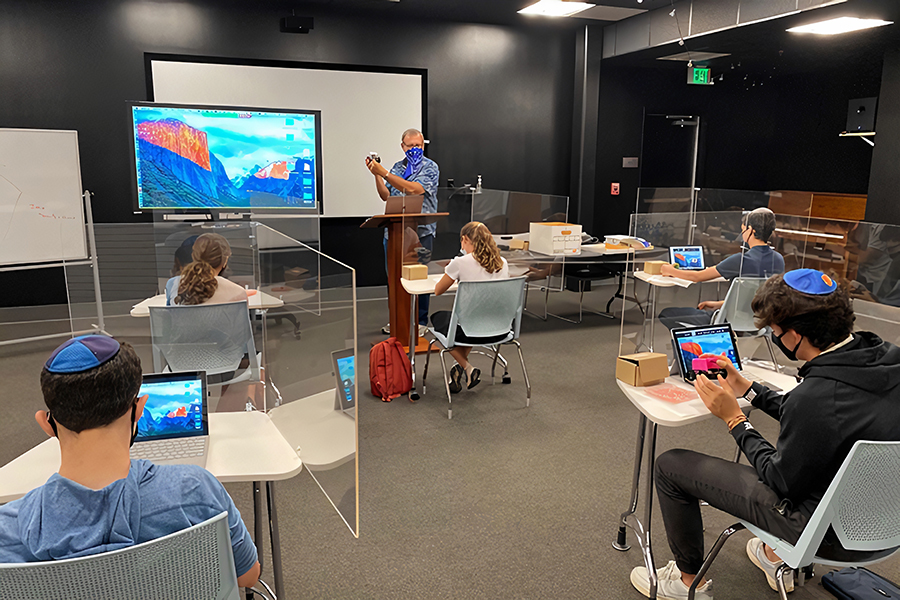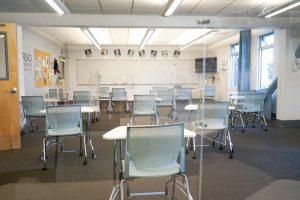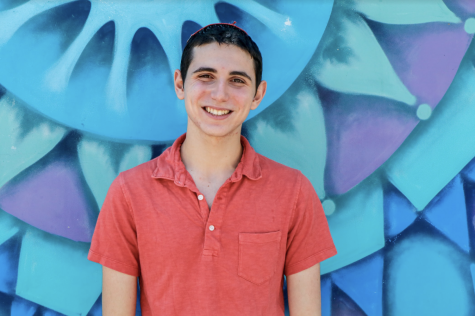For the Shalhevet building, spring vacation ended in summer
After four months of remote learning, people returned for weeklong enrichment classes and a summer camp for kids
September 6, 2020
The Shalhevet campus came back to life this summer as students filled the science lab, theatre, cafeteria and room 216 for a summer enrichment program while a day camp met in the gym and on the third floor.
The enrichment program, which consisted of week-long, in-person seminars that began the week of June 29 and ended the week of July 20, offered more than 10 classes to incoming freshmen, sophomores, juniors, and seniors.
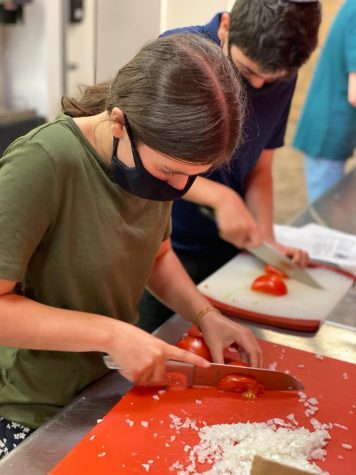
According to General Studies Principal Mr. Daniel Weslow, more than 70 students attended, about 30 of whom took more than one class.
Mr. Weslow said the goal was to get students out of their homes following the coronavirus lockdowns of last spring, and also to “connect with teachers at Shalhevet, as well as learn something that they are interested and passionate about,” while having some fun.
“The creation of the summer enrichment program was based out of so much uncertainty, and us wanting to provide a unique and fun experience for our students,” Mr. Weslow said in an interview.
There were two sessions a day, a morning and afternoon session, and each class met for four days. In email blasts, the classes were advertised as “In-Person Socially Distanced Learning,” with a maximum of 15 students each. Each class cost $25 for the week.
Classes included Cooking and Culture with Mr. Tushar Dwivedi, Art taught by Ms. Roen Salem and Ms. Natalie Honig, and Controversial Monuments and Flags in the U.S., taught by Dr. Keith Harris.
Each morning before entering, students had their temperatures taken in the foyer of the building by either Registrar and Facilities Director Ms. Lili Einalhori or Ms. Muriel Ohana, assistant to Head of School Rabbi Ari Segal.
Inside the classrooms, students’ desks were six feet apart from each other with plexiglass dividers on the front and right side of each desk. An exception was classes held in one of the science labs, which did not have plexiglass dividers on the lab tables. Mr. Weslow said school officials are currently assessing the best place to install them, and Ms. Einalhori said other precautions are being taken.
“The six-feet separation is strictly observed there, with a small student class size,” Ms. Einalhori said via email.
Cleaning was another change the school implemented for the enrichment classes. Mr. Weslow said desks were wiped down and cleaned before and after each enrichment day.
“Our facilities crew did a phenomenal job making sure that we were in line with making everything clean and safe,” he said.
Tomomi Shaw, an incoming freshman, attended the Creative Writing class given by Mr. Brian Forrester. She said she felt very safe because everyone was taking the safety precautions seriously.
“Especially with us coming in and out of the classrooms we were still social distancing and everything,” said Tomomi. “So everyone had in mind the precautions to take.”
Junior Gabriella Gomperts attended the Creative Writing class and also Rabbi Abraham Lieberman’s class, Crash Course: Iyov and Theodicy.
“With Rabbi Lieberman we learned about Job and that whole story, and the broader questions that that story offers up, and so I think we had really good conversations,” said Gabriella. “I actually felt really safe — all the desks were at least six feet apart, we had the plexiglass, and we had the masks on.”
Elsewhere on campus, however, rules were different. MJ Sports Camp, a program for children ages 3 to 12 run by Shalhevet Dean of Student Life Dr. Johnny Ravanshanas, met on the third-floor turf and surrounding classrooms, and in the gym.
Day camps were officially allowed by the Los Angeles County Health Department throughout the summer, and according to media reports are still running on some school campuses now.
There was almost no interaction between campers and Shalhevet students. According to Mr. Weslow, neither campers nor counselors were allowed in rooms where classes took place, and Boiling Point reporters saw campers only occasionally — for example in small groups passing on the foyer stairway.
Dr. Ravenshanas, who has been running the camp at Shalhevet for the last three years, said that campers had their temperatures taken as they entered the building and followed other protocols, including grouping them into pods that did not interact with one another.
“We grouped them so God forbid if there was any type of outbreak — and thank God nothing happened — we’d close down that pod,” Dr. Ravanshenas said.
To incentivize families to keep campers home if they had any hint of illness, the camp also offered a “money-back guarantee” to parents whose children had to stay home for COVID testing or quarantine, he said.
Dr. Julie Higashi, the Los Angeles health department’s Tuberculosis Controller and a member of Shalhevet’s medical task force, said that the camp was following a “pod-type model” where a group of the same campers stay together with the same instructor.
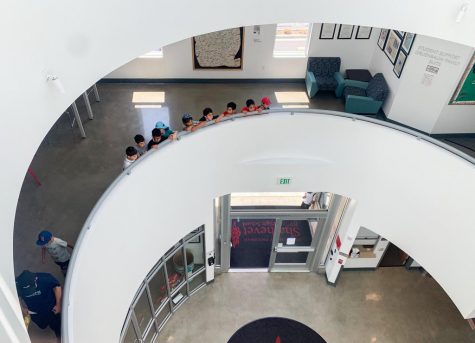
Campers were not strict about masks, however. Dr. Higashi said rules for younger children were generally different from those for teens, and that also, during the summer health department guidelines for face masks at day camps changed.
“There was an evolution to the understanding of what face-covering-wearing expectations were for children over the age of 3,” said Dr. Higashi.
“When you have kids under a certain age, they can be in pods so as long as they’re in the same group and they have the same instructors,” she added. “They don’t need to be socially distanced, because it’s just considered to be an unrealistic expectation.”
Now that the school year has started online, Shalhevet is offering in-person enrichment classes once again, as a part of Camp Firehawks where students are able to come on campus.
Like the enrichment classes over the summer, they meet in person, four days a week, outside of school hours, and are taught by Shalhevet teachers but on subjects that are outside the regular Shalhevet curriculum. Among them are “Creative Drama and Video,” taught by drama teacher Ms. Emily Chase, and “Banned Books: Judaic Edition,” taught by Rabbi Lieberman.

